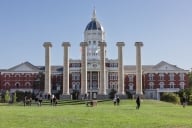You have /5 articles left.
Sign up for a free account or log in.
Nebraska on Tuesday became the fourth state to ban the consideration of race in admissions decisions by public colleges and universities. California, Washington State and Michigan have previously approved such bans.
With more than 90 percent of votes counted in unofficial results, 58 percent of Nebraska voters were backing the ban. A similar measure in Colorado was narrowly behind, with 86 percent of the vote counted early Wednesday and without a clear indication of the final outcome.
Even if Colorado also bans the consideration of race, the 2008 elections will end up inflicting a lesser blow to affirmative action than many originally believed would be the case. Ward Connerly, the anti-affirmative action activist who led the fight against the consideration of race in California and then took his campaign national, had hoped Tuesday would be a "super Tuesday" for his movement -- and at one point planned for referendums to take place in Arizona, Missouri and Oklahoma in addition to Colorado and Nebraska. But difficulties with getting petitions on the ballot led to defeats for his effort before the measures could go before voters -- and that's crucial because, when given the chance, voters have tended to approve such measures.
Educators in Nebraska and Colorado -- as have educators in the other states that have passed these measures -- warned that passage would make it more difficult to recruit and retain diverse student bodies.
Advocates for affirmative action and for curbing affirmative action split as expected on Tuesday's results.
"We had terrific success this year in keeping it off the ballot in three states," said ReNee Dunman, director of equal opportunity and affirmative action at Old Dominion University and president of the American Association for Affirmative Action. She said that state activists were growing more aware of the "deceptive tactics" used to promote such referendums -- and were giving ballot petitions more scrutiny.
While the Nebraska vote will "squelch opportunity," she said that 2008 was overall a successful one for those defending affirmative action.
Roger Clegg, president of the Center for Equal Opportunity, which opposes the consideration of race in admissions, said he sees the Nebraska vote as one more step in doing away with preferences. "I don't think very many people want there to be these kinds of preferences indefinitely and the sooner we can get rid of them the better," he said.
He said every additional state to bar the consideration of race is significant. Part of the legal defense of considering race involves public colleges saying that they have no alternative ways to promote diversity. As more states eliminate the consideration of race -- and many of them find ways to still have diverse classes -- "How plausible is it" to make that claim? Clegg asked.
Clegg also asserted that the election of Barack Obama as president of the United States shows not only that the country is making racial progress but that "preferences based on race, ethnicity and sex are quickly dying, and that's a good thing for the country."
Dunman disagreed. "The fact that the nation has elected the first African American president clearly shows we have made tremendous progress," she said, but "we have a long way to go." If people point to Obama's success to say nothing more needs to be done, that would be "tokenism" at a time that "we need to be keeping all the doors open for more people," she said.
The debate over affirmative action in Nebraska was in some ways quieter than the debates that took place before votes in California and Michigan, states that are more racially diverse and where undergraduate admissions to flagship universities are highly competitive. But the University of Nebraska Board of Regents came out against the ban. Student supporters of affirmative action organized protests. And Clegg's group issued a report suggesting that admissions standards at the university's law school gave significant and unfair preferences to minority applicants -- a conclusion disputed by law school officials.
Polling in Colorado had indicated strong support for the proposed ban. The University of Colorado conducted a review of its programs and determined that many would need to be modified to comply with a ban.








